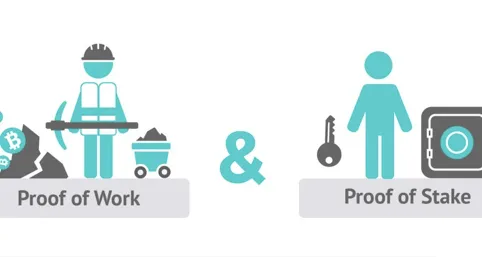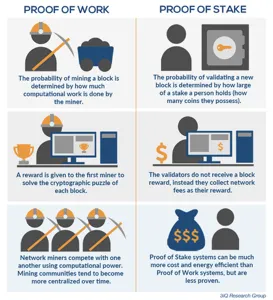Proof-of-Work and Proof-of-Stake
Every now and then a battle sparks up in the crypto-community, be it reddit (the Mecca of all disagreements) or bitcoin.org forums, or private chatrooms or even Twitter; is Proof-of-work really worth all the energy that we put in?

This question has been the central point of a lot of fiery debate. Everyone seems to have an opinion of their own. The stage is not unlike a street fight, where members of both sides go down to calling each other names, exchanging abuses and branding the other side as un-visionary. Most bitcoin maximalists side with PoW, recounting the game-theoretic incentive structure that it implements to solve the age-old Byzantine Generals’ Problem. Other skeptics argue that PoW isn’t really worth all the energy consumption it brings along with it. And then there’s the other side that proudly proclaims the simplicity and elegance of Proof-of-Stake and similar concepts that implement all of PoWs infrastructure excluding its infinite appetite for energy.
Criticisms are necessary and all, but when are we finally settling on a serious real-world use case?

Source: HackerNoon
The Argument For
For POW
The basic argument made by PoW supporters lies in the fact that it solves the most fundamental problem traditionally existing with a protocol for money on the internet; a legitimate medium to verify value flow without the possibility of duplicity. Since the dawn of the Internet, it has been both lauded and criticized for its ability to multiply information. Due to its infrastructure that basically involves the transfer of packets in a pre-defined protocol, it is easier to copy stuff on the internet than it is to gulp down water. Thus, by combining an authentication of work with information transfer, PoW solved the problem of multiplicity in the only remaining void that remained to be filled on the internet. An article by developer Paul Sztorc titled ‘Nothing is cheaper than Proof-of-Work’, does a really good job of arguing for the use of PoW.
For PoS
On the other side, skeptics of PoW almost always point out the energy consumption problem going as far as proclaiming that if not kept in check, bitcoin mining operations could lead to an acceleration of the already threatening problem of Global warming. The mining operation of bitcoin alone consume more electricity than 159 countries. Plus, there’s the tedious task of building and maintaining rigs that carry on the tasks of problem-solving for PoW.
The Argument AGAINST
Against PoS
PoS uses a time-stamping method to reach a consensus about a block by betting on it. This process alone opens a variety of criticisms. Say the betting amount is said to 10,000 ABCoin, and the average holder has about 20 ABCoin. So anyone with the minimum betting requirement is bound to get richer with each block while the others wait for the chance to place a bet until. Not everyone can afford to be a staker. It can be argued that over a period, the gap will become significant, and therefore, the power to influence the ABCoin network will lie in the hands of a few, not unlike the current state of the Bitcoin PoW network.
Against PoW
The major difference in PoW and PoS lies in how each treats a malicious node. As PoW follows the longest chain wins philosophy, meaning the chain with the most hash power committed is the legitimate chain, it could allow malicious nodes to escape if enough hash power is committed. In PoS, the dishonesty is penalized instead. Because forgiveness is the default in the former, there’s nothing stopping people from being dishonest. On the other hand, the PoS makes sure that dishonesty is severely discouraged by putting the penalty. Most users also view PoW as an inevitable monopoly. At least with respect to bitcoin. As the difficulty increases, it becomes more and more costly to operate hardware necessary to calculate the PoW algorithms. Thus, given a long enough timescale, a few entities might rise Hugh enough to control all the hash power as most users cannot afford high end, pricy equipment.
“In proof of stake, besides incentivizing honesty, dishonesty is discouraged.”
Mohit Mamoria, Is Proof of Stake really the solution?, HackerNoon
Conclusion
Without constructive criticism, it is not really possible to move ahead and leave behind all the flaws. To side with a particular mechanism cannot be seen as the right thing to do as there are a lot of intellectually capable people behind each side. Numerous research papers, articles, and discussions have been put forwards, arguing for both sides of the debate.
Experimentation had been steadily going on, such as Ethereum’s much-awaited Casper FFG, with its planned shift from PoW to PoS, making all the hardware devices dedicated to the network obsolete. It would also mean an increase in adoption as it becomes more cost effective to be a part of the network. Similar advancements are also being implemented by EOS, NEO, XEM, Reddcoin, Lisk and so on, trying to sway the market towards the staking mechanism. Some iterations of the algorithm such as delegated Proof-of-Stake (dPoS) and Hybrid PoS + PoW are also being experimented with.
On the other side, there’s the continuous research by Monero, ZCash, DASH among others, continuously trying to perfect the PoW algorithm by making them ASIC resistant, decreasing energy consumption and simplifying problems without compromising on the security. This show the dedication towards the original Proof-of-Work algorithm developed by Cynthia Dwork and one Naor, ultimately perfected by Satoshi Nakamoto in the Bitcoin Whitepaper.
It remains to be seen which way the market sides, which algorithm pushes itself towards the top. But one thing is for sure, the general audience is definitely going to b benefitted due to the internal fights within the community.
Sources
- Expanding Bitcoin use will push global warming above 2C in two decades, finds study
- BITCOIN MINING IS A SIGNIFICANT CONTRIBUTOR GLOBAL WARMING, WARN SCIENTISTS
- Bitcoin’s energy consumption isn’t as bad as you think
- Critique of Buterin’s “A Proof of Stake Design Philosophy”
- A case against Proof of Stake Velocity
- Is Proof of Stake really the solution?
- SB
---
ReverseAcid Monthly Recap
---
Crypto Analysis Series
- Part 1 - Basic Attention Token and How It's Revolutionizing the Internet
- Part 2 - Golem Network Token as a Potential Giant Killer
- Part 3 - Augur and the Future of Decentralized Predictions Markets
- Part 4 - Dogecoin - Such Meme, Much Value
- Part 5 - Zilliqa
---
Previous posts:
- The Stablecoin Ecosystem and It’s Importance to Digital Payments
- Looking Back at the Ethereum Hard Fork Timeline - A Precursor to Constantinople
- Gold Making A Rebound
- Blockchain Patents Race
- XRP-USD Chart Breakdown: Daily Timeframe
- Governmental Incentives for Implementing Distributed Databases
- Current Scenario of the Global Stock Market: A Detailed View Into Major World Indices
- Giving in to Your Fear: Does the Current Market Warrant this Magnitude of FUD?
- DLT, Blockchain, and Cryptocurrencies: What it all Means for FinTech and More
- Confidence Crisis: HODL on to Your Horses
- Bitcoin Technicals: In Depth Breakdown of the Current Move
---
About Reverse Acid

---
Be a part of our Discord community to engage in related topic conversation.

---
Follow our Instagram and Twitter page for timely market updates

